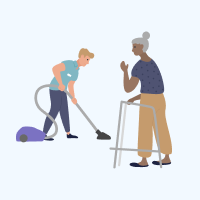Moving into an aged care home is often a time of stress, high emotion and uncertainty. It is a challenging and emotional decision for the person moving and their family, friends, and carers.
Signs that the person you care for may benefit from moving into an aged care home include:
- significant difficulties moving around
- significant incontinence problems
- challenging behaviour such as wandering
- significant problems communicating
- difficulties in thinking, planning and remembering.
Even if moving to an aged care home is agreed to be the best option, as a carer you may face some unsettling issues. There will be changes in your routine and lifestyle. For example, you may have feelings of guilt or be worried about whether the right decisions have been made. You may also miss the companionship, but at the same time you may be relieved to share the caring role.
The move into an aged care home may also raise financial or legal concerns.
Questioning your decision
Everyone’s situation is different but it’s normal for you to be asking yourself some questions. Some people might be asking:
- Will the person I care for be looked after properly?
- What will other people think of me?
- Have I done everything I could?
- Am I a failure because I can’t care for them at home anymore?
- What will I do with my life when I’m not so busy?
It can be hard to think about your own needs, but it’s important to be realistic and try to decide what’s best for everyone, including you. Only you can decide if the responsibility of caring is too much for you. Carers in similar situations suggest the following tips:
- talk to someone who’s a good listener
- let others help you work through your feelings
- consider carer counselling services.
Continuing your carer role
You can still help out and care for the person you have been looking after once they move into an aged care home.
You will probably provide care in partnership with health professionals. This may sometimes be difficult, especially if you haven’t had much experience working with them before.
One way of thinking about working with these health professionals is to consider yourself as an important part of a team. The team can include nurses and social workers, as well as the person’s doctor and medical specialists. As a carer you’re an important member of that team, not just for the emotional and social support you give.
Other carers offer the following tips:
- know who the health professionals are and write down information about them
- take someone with you to appointments to be an extra listener
- take notes
- write a list of questions so you don’t forget anything
- keep a diary of your family member’s problems or symptoms
- ask for information to be written down, particularly about their diagnosis or medications
- ask if your health professional can give you any printed material or tell you where to find more information
- make an appointment without the person you’re caring for being there to talk about your concerns
- ask the receptionist to book a longer appointment if you feel there is never enough time
- speak up for yourself and the person you care for.
For more information and tips to help you continue in your caring role, visit the Carer Gateway website.


